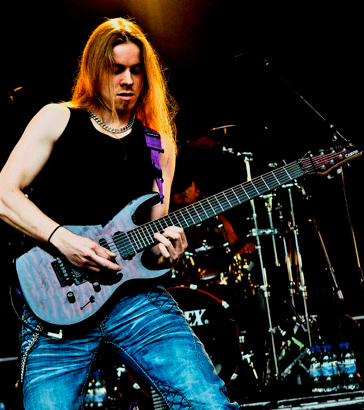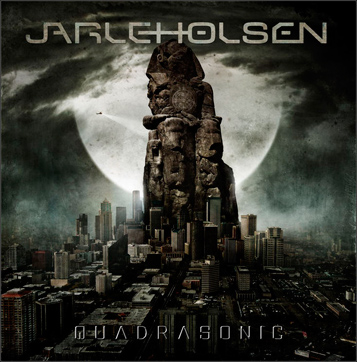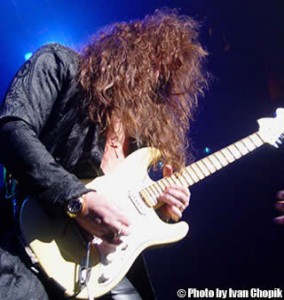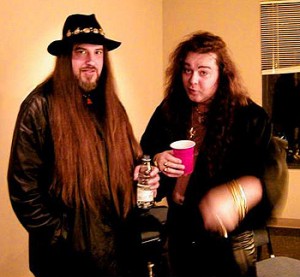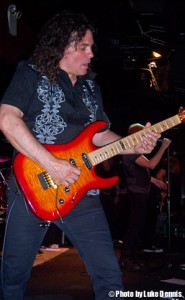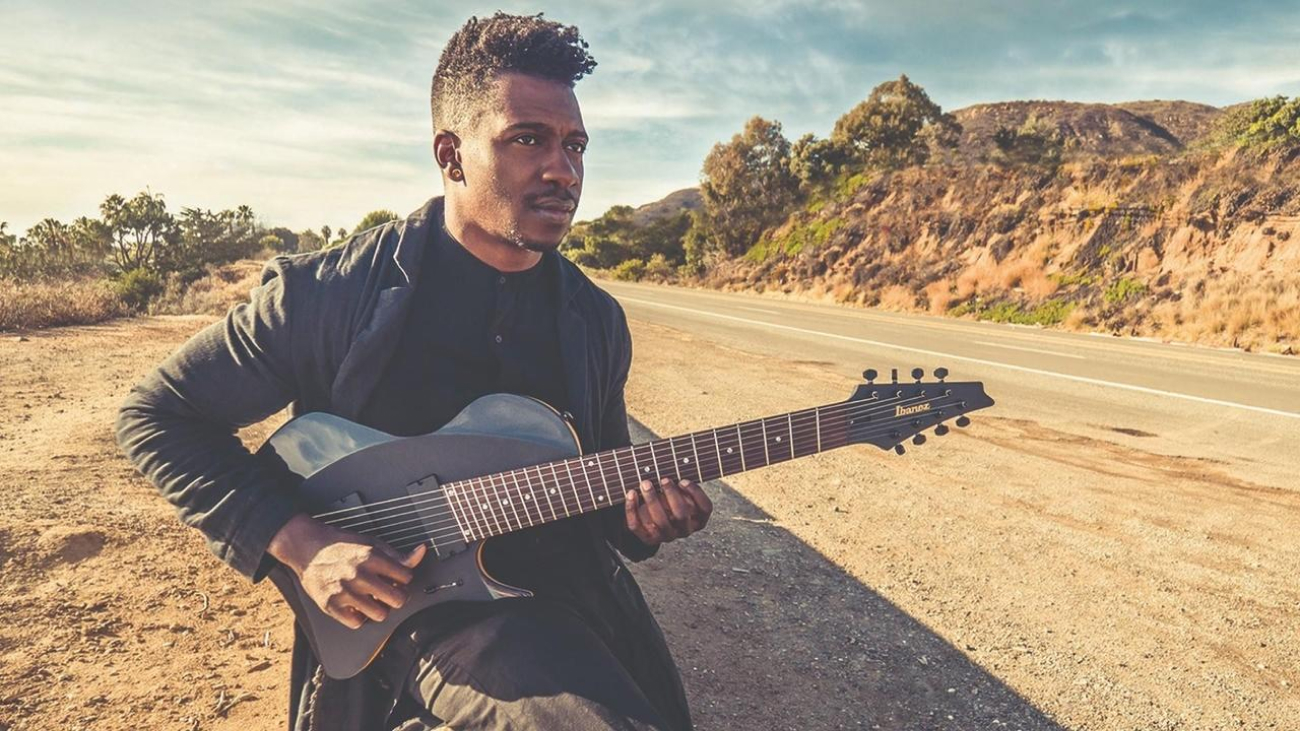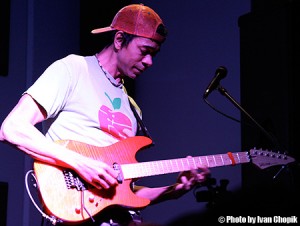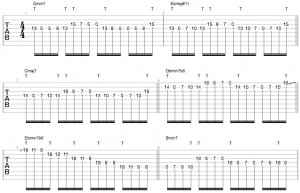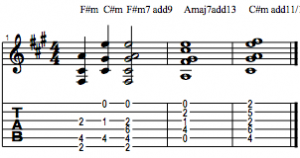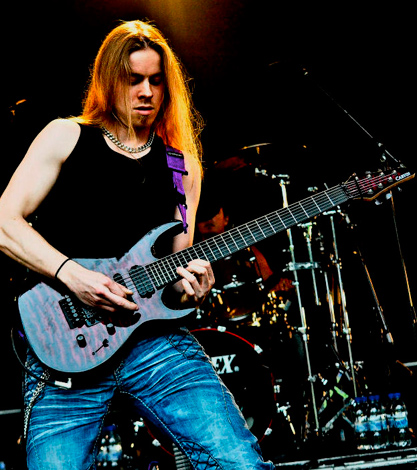 Hailing from Norway, Jarle H. Olsen is one of today’s finest guitarists and composers of melodic progressive metal. His full-length debut album, Quadrasonic, showcases his talents through its emotive atmospheres, surgically precise performances, and lavish harmonies. Rooted in neoclassical metal and fusion playing styles, Jarle has forged a recognizable voice on his instrument; one which he never fails to pair with memorable melody and elegant songwriting.
Hailing from Norway, Jarle H. Olsen is one of today’s finest guitarists and composers of melodic progressive metal. His full-length debut album, Quadrasonic, showcases his talents through its emotive atmospheres, surgically precise performances, and lavish harmonies. Rooted in neoclassical metal and fusion playing styles, Jarle has forged a recognizable voice on his instrument; one which he never fails to pair with memorable melody and elegant songwriting.
IC: Can you tell us about your current projects? I know that last year you released your first full-length solo instrumental album, Quadrasonic, and you have a new record out with your thrash metal band Pitch Black Mentality.
JO: My main project is Quadrasonic and I’ve started working on some new material for it, as well. Apart from that, I have another funny project with Bjarte and a friend coming up, featuring over 30 tunes. So stay tuned…
Yeah, my buddy [Frank Natås] recently released a new album called The Pitch Black Reality, which I happen to play all lead guitars on. It’s basically old school thrash metal with some new twists here and there. I can recommend it to any metal fans, as there are plenty of kick-ass thrash tunes on the album.
IC: How would you compare the writing and recording processes for Quadrasonic and The Pitch Black Reality? What were some of the challenges of each project?
JO: The songwriting sessions for Quadrasonic were a very evolving and lonely experience. It was about identifying my own style, as much as it was about challenging myself, musically. The dedication and challenge with Quadrasonic came more from the compositions, rather than the performances, actually. I really wanted to make a unique and solid-sounding album, based on my perspective of what a good sounding, complete album should sound like. As I look back on it, I feel that I’ve achieved that goal of mine.
For the Pitch Black sessions, they started out with my buddy Frank who invited me to join him for the songwriting. He had some heavy riffs and cool ideas, and we cooked it all together to complete the tunes. He is generally more inspired by harder hitting metal stuff than I am, so his aggressive riffing style, combined with my more melodic and progressive ideas worked out well.
This was more of a collaborative experience and my challenges here were the leads. I wanted to play more intensely and aggressively for this kind of music style, yet melodically and in control. For instance, Alex Skolnick was a major influence for me in the early days and I really enjoyed his contributions to Testament. He’s by far the best and most underrated thrash guitarist when it comes to lead playing.
IC: What is the significance of the album title, Quadrasonic?
JO: Quad means four and sonic means having a speed about equal to that of sound in air. The project has four members and the music may at times become kinda speedy in terms of notes. So there you go… hehe.
IC: You re-recorded one of your signature tracks, Osiris, for Quadrasonic. Since its original 2002 release, the composition has evolved into three movements. How has the meaning of the piece changed for you since you first recorded it and were the additional movements written around the same time as the first?
JO: That’s the oldest tune on the disc, from a 2002 demo, and I didn’t have any more parts to it then. I later wrote a tune that had the same kind of dark vibe as Osiris, which eventually became part three. I also had this ethereal, floating string progression, which reminded me of the Middle Eastern music culture, which I really love and wanted to add in there.
So I decided to make a saga of these three parts, since they fit together pretty well. It tells the story of Osiris, the omnipotence, in a musical language. From his days as the almighty king to his resurrection in hell… if you’re into mythology and that kind of stuff.
IC: One of the ways in which the compositions on Quadrasonic stand out to me is through the fresh use of harmony throughout the record. In particular, tracks like ‘Dark Matter’ and ‘From Deep Within’ stood out with some unusual note choices and chord progressions. What are some of your favorite scales and tonalities that you have been exploring?
JO: I don’t have any favorite scales or tonalities really. Although, I do prefer playing in darker modes and writing serious sounding music. It has such a unique depth. I can’t write exclusively major modal music or music that contains humor… it doesn’t move me, but rather bothers me.
IC: The tones on Quadrasonic sound fantastic! What’s your current gear setup?
JO: I use Carvin guitars and Dimarzio pickups exclusively. That’s also what you hear on the entire album. For the amp setup, I used various things. The rhythm tones are two 50w VHT heads into 4×12 cabs, with a two mic setup – a Shure SM57 and a Neumann. The lead tones are one of my two custom made “piece of shit” amps, which I now use exclusively.
IC: Can you fill us in on what you’ve been up to in the gap between Quadrasonic and your previous release in 2002? How have your influences and musical preferences changed over the years?
JO: Now that’s a long period of many life happenings… As for the musical aspects, I did some gigs with Quadrasonic back then. We did instrumental stuff, but slightly different sounding than what it is now. I also contributed to various other musical projects throughout the live scene. I was rehearsing and perfecting my style of playing, I suppose.
IC: You have some of the most precise and cleanest picking skills in the business. Are there any tips you can offer for guitarists looking to clean up their technique?
JO: You know, I see technique as a tool. It helps me to bring the ideas in my head to life, and for that you don’t want any physical limitations. I guess I use a mix of alternate and economy picking, depending on what sound I want. Again, I hate limits and don’t want to be trapped in a specific technical pattern.
| Jarle’s 2011 feature – ‘Sweeping Harmony.’ Click HERE for the full lesson. |
You mentioned clean… well, electric guitar can be a very noisy instrument when you’re using overdriven tones. If you’re not precise, it can easily become an unlistenable mess, especially at high tempos and with complex patterns. You want to make what you’re playing loud and clear to the listener. Make it easy for the listener to understand what you actually want to say with the notes. After all, it really doesn’t matter if you have the cleanest or fastest chops on the planet if you can’t use them to make good music – which is what matters.
IC: Though your home is in Norway, you also spend time in Chile working with projects like ASP4 (Alejandro Silva Power Cuarteto). How did you get involved with this project and what is it like traveling back and forth across the globe?
JO: I’ve been to Chile several times since I first went there back in 2003. I met up with ASP4 in 2004 and we played a cool event together. After that, we kept in touch throughout the years and I met some really good musicians over there, whom I later toured with within the country. There are loads of fans and dedicated people within the metal scene there, very nice people. In 2011, we did a major tour there, which was pretty successful. It’s a great experience traveling, meeting new people from other cultures, and knowing that your music is being appreciated by dedicated fans!
IC: From your experience, how would you compare the music scenes between the two countries?
JO: The expression and dedication is much different, although it’s kind of unfair to compare the countries due to the extreme population differences. Interestingly enough, many more people shows up at the gigs there, than here in Norway. But I also believe that it has to do with the hunger for experiencing real music live. The audience there knows what they want and you have to deliver.
JO: The Internet has provided a vital connection between artists and listeners, particularly within the guitar instrumental music niche. With the web becoming more saturated every day with music-related content, is it still as reliable of a medium to connect with your fans as it was in the past? How do you balance your career in terms of live performances, lessons, clinics, etc… and your online presence?
JO: It’s so much easier to connect with new people because of the global network and media sites such as Facebook and YouTube. You suddenly get every musician in the world on your laptop. There really is no need to suck these days! hehe… With such an enormous amount of information on the web, the only issue I can see with the amount of lessons, videos, etc…. is that a lot of people seem to forget the most important part of it all – to actually play!
Jarle H. Olsen – Osiris – The Omnipotence
The web can so easily consume all your time in a blink of an eye, if you’re not disciplined enough. I remember sitting with tape recorders, rewinding the tape until it got all fucked up, just because I wanted to learn a specific part of a song so badly. It really sharpened my ear training abilities. Nobody “wastes” time on that now, of course. Instead, everybody wants it served on a plate, and if not well-served, they go browse for the easiest solution on the Internet. Sometimes, the easiest way ain’t the best. It happens with games, as well as with music, and everything else.
The only reason I do have Facebook, is to promote myself and my music. Nothing else. If I didn’t do music, I would probably not have an account. Some people like to upload pictures of what they eat every day or even how damn funny the cat next door looks. I’d rather prefer posting stuff regarding my musical career. Different pleasures…
IC: Surely a great deal of your time is devoted to music, but what do you like to do in your off-time? What are some of your hobbies?
JO: I love going on extreme mountain trips. Experiences in the wild and fantastic nature are when you’re in inner harmony with yourself. It’s a refuge and it’s soul refreshing, just like music, allowing you to forget about all the shitty things going on in this forsaken world. I’m also a huge movie fan and have way too many blu-rays already. I also enjoy going out, being social, having some drinks with friends once in a while. Love swimming. Got to do other things apart from music, as it’s my everyday work.
IC: What are your plans for the rest of the year?
JO: There may be some touring plans with Pitch Black. I also wanna try to play more live with Quadrasonic, as always. And we’re going to finalize another major music project, which I briefly mentioned earlier. Probably other plans too, but I do not like to plan too much in advance. Things usually turn out differently than you would expect, anyway.
IC: What advice can you give to aspiring musicians looking to take their musicianship to the next level?
JO: The sky is the limit. If you believe in yourself and your goals, realize them! But for god’s sake, please do have some self-awareness. Know your abilities and limits and work them hard!
For more information about Jarle and his music, please visit JarleHOlsen.com, Facebook.com/jarleholsen, and YouTube.com/jarleholsen.



